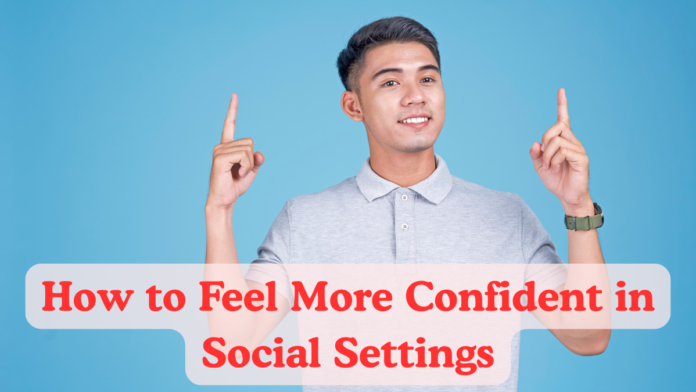Social confidence isn’t just for extroverts or public speakers. Whether you’re at a work event, a party, or a first date, knowing how to feel more confident in social settings can change how others see you—and how you see yourself. The good news? Confidence is a skill, not a personality trait. With a few mindset shifts and tactical habits, you can train yourself to show up calm, clear, and connected.
Below are practical ways to boost social confidence and overcome awkwardness, grounded in psychology and real-world experience.
How to Feel More Confident
1. Stop Trying to Impress—Start Trying to Connect
A common social trap is thinking you need to be impressive. That mindset creates pressure and leads to overthinking. Real confidence comes from focusing on connection, not performance.
Try this: Instead of rehearsing clever lines or talking about your achievements, ask questions and listen deeply. People feel more connected to someone who shows interest, not someone trying to be interesting.
Social proof: According to a Harvard study, people who ask more questions—especially follow-ups—are perceived as more likable and socially skilled.
2. Prepare, Don’t Script
Preparation builds confidence. But scripting every word does the opposite—it makes you stiff and anxious when conversations go off-course.
Better approach: Think about a few general topics you’re comfortable talking about: a recent book, travel plans, current events, or hobbies. Use these as conversation springboards, not scripts.
Boost tip: Rehearse your personal introduction so you’re not caught off guard when someone asks, “So, what do you do?”
3. Shift the Spotlight Off Yourself
Overthinking what you’re saying or how you look? That’s natural, but it also fuels self-consciousness.
Reframe: Focus outward. Pay attention to the person in front of you—their tone, body language, and interests. When your attention shifts to them, your anxiety naturally drops.
Pro tip: Try grounding yourself by noticing three sensory details in the room: a sound, a color, and a texture. It pulls you out of your head and into the moment.
4. Own the Awkwardness
Awkward moments happen to everyone. The confident people? They acknowledge it and move on.
Example: If you forget someone’s name, just say, “I’m sorry, I spaced—what was your name again?” Owning it clears tension and shows maturity.
Overcome awkwardness mindset: Mistakes don’t ruin social interactions—pretending you’re flawless or getting flustered by small missteps often does.
5. Use Body Language That Signals Confidence
How you carry yourself influences how others perceive you—and how you feel about yourself.
Do this: Stand tall, keep your shoulders relaxed, and maintain open posture. Smile and make natural eye contact.
Science-backed tip: A study from Amy Cuddy at Harvard shows that adopting “power poses” for just two minutes can increase feelings of confidence and lower stress.
6. Set Manageable Social Goals
Trying to be the life of the party when you’re still working on small talk is a recipe for overwhelm.
Growth strategy: Set small, clear goals. For example, “I’ll introduce myself to two new people” or “I’ll stay at the event for 45 minutes.”
Progress builds confidence. Small wins compound and help you feel more capable in larger or unfamiliar groups.
7. Practice in Low-Stakes Environments
You don’t build social confidence by avoiding social interaction—you build it by showing up and learning.
Start small: Talk to a barista, make small talk at the gym, or chat with a coworker. These moments sharpen your social skills and build muscle memory.
Think of it as training. The more you engage socially, the more natural it becomes.
8. Challenge Negative Self-Talk
If you walk into a room thinking, “I’m awkward” or “No one wants to talk to me,” you’re setting yourself up to feel isolated.
Reframe with facts: Remind yourself of times when conversations went well. Say to yourself, “I’ve connected with people before. I can do it again.”
Boost tip: Use affirmations like “I belong here” or “I’m curious about who I’ll meet today.” Speak to yourself the way a trusted friend would.
FAQ
Start by embracing the fact that everyone feels awkward sometimes. Focus on listening more than talking, use open body language, and set small social goals to build comfort.
Absolutely. Social confidence doesn’t require being the loudest—it’s about being authentic, prepared, and present. Introverts can be powerful connectors when they lean into their strengths.
Take a few deep breaths, stand in a confident posture, and remind yourself of your strengths. Then focus your intention: “I’m here to connect, not impress.”
Why do I overthink everything I say?
Overthinking often comes from fear of judgment. Training your attention outward—by focusing on others—helps quiet that internal critic.
Final Thought
Feeling more confident in social settings isn’t about being perfect—it’s about being present. The most magnetic people aren’t flawless; they’re real, curious, and comfortable with who they are. Start practicing that today, one conversation at a time. Confidence isn’t something you wait for—it’s something you build.




